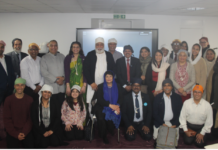Sanskriti and lifestyle
By Dr. Sudha Vashisht

There are some days which are just average and normal, lived in a kind of humdrum routine manner, on autopilot mode. Then in a moment something happens to wake you up from autopilot living. You read something really vile and tamasic. That writing is so seriously vile that it creates a strong gut reaction and focuses one’s entire mind and energy to formulate a rebuttal to what has been read.
This happened to me just a few days ago. I read the following in an Indian business newspaper.’ If you are willing to invest for a ‘very long term’ then consumption stocks (alcohol) are still the favourite of fund managers. Alcohol is a good sector to invest in as the per capita consumption of alcohol per person in India is really low. When the incomes rise gradually, the consumption patterns might shift to branded liquor. Apparently the ROE of United Breweries & United Spirits will improve going forward making them good investment opportunities.
It is clear that an unintelligent person has written this, and he has no idea about the consequences of what he is promoting. He may know the consequences but may not care, as is often the case with Capitalists who see profit as the sole driving force for their actions. I appreciate that what I am about to write may not be new or unique. This subject matter has been covered extensively in the shastras, in the ‘old’ Hindi cinema and on sites such as alcoholconcern.org.uk. However, the rise of anti-Sanskriti is now promoting alcohol in the modern Hindi cinema showing song and dance routines in clubs where young people are drinking alcohol, or going to a restaurant to have a ‘civilised’ drink of wine with their meal. Many restaurants in Bharat have a list of the alcohol drinks available. The beers such as Cobra are almost ubiquitous in Indian restaurants in the UK.
So I will present the unglamorous and ant- Sanskriti facts relating to alcohol.
Alcohol related harm costs England around £21bn per year, with £3.5bn to the Health Service, £11bn tackling alcohol-related crime and £7.3bn from lost work days and productivity costs.
Alcohol now costs the Health Service £3.5bn per year- equal to £120 for every tax payer.
In the UK, in 2014 there were 8,697 alcohol-related deaths.
Alcohol is a causal factor in more than 60 medical conditions, including: mouth, throat, stomach, liver and breast cancers; high blood pressure, cirrhosis of the liver; and depression.
A fifth (29%) of all violent incidents in 2013–14 took place in or around a pub or club. This rises to 42% for stranger violence. Over two thirds (68%) of violent offences occur in the evening or at night
7.5 million people are unaware of the damage their drinking could be causing.
More than 9 million people in England drink more than the recommended daily limits
A minimum unit price is one of the most effective strategies of reducing alcohol-related harm. Selling alcohol for no less than 50p a unit would tackle health inequalities and reduce alcohol related crime
Adults living in households in the highest income quintile are more than twice as likely to drink heavily as adults in the lowest income quintile – 22% compared to 10%.
Alcohol is 10% of the UK burden of disease and death, making alcohol one of the three biggest lifestyle risk factors for disease and death in the UK, after smoking and obesity.
Alcohol was 61% more affordable in 2013 than it was in 1980.
Based on the knowledge above, would an intelligent person, community or government promote alcohol, whatever the ‘revenue’ in licensing and taxation may be. My answer is NO. So it is with dismay I see the promotion of alcohol at cricket matches, Diwali dinner and dance events, New Year events, restaurants and expensive hotels and other venues and functions.
There is the argument about choice and sensible drinking. Clearly that has not worked, at least in the UK, as confirmed by the above facts. The UK, with its wisdom based on almost naked Capitalism has relaxed the laws on selling alcohol and allowed increased opening hours for pubs over the last decades, with increased alcohol consumption and the obvious increased health and social problems. After working in some drug addiction clinics, I have often thought of the benefits that prohibition could bring.
It has been said that if alcohol had been ‘invented’ today, it would not get a license with the authorities, because it is such a dangerous and powerful drug, which is misused so easily. The countries of Europe cannot turn the clock back and reduce or stop its use. The industry and lobby is too powerful. The people are ‘addicted’. Nonetheless this powerful industry is trying to expand worldwide, to expand and sell these illnesses and social problems worldwide. This is the new imperialism.

When I travelled in Bharat recently, even in central Hindi belt Bharat, I saw a shop in every bazaar selling alcohol- some claimed to be selling videshi sharab, as if that was some sort of commendable achievement. Every shopping area in Chandigarh has a ‘Sharab ki dukaan’. There is such a shop to be seen in nearly every block of the shopping bazaar. There is a large duty free selling alcohol in every new airport. This is especially visible in Dilli. This is part of the progress that Bharat is making.
Bharat is a country full of young people, and many of these young people have ambition and energy and not as much money as they would like to have. The young are easily led with strong marketing and the lure of easy money.
I am compelled to ask. Is this the route to civilisation? Is this the progress and civilisation that Bharat needs and should aspire to?
My answer is a definitive NO.
Today Bharat ‘s alcohol consumption is one of the lowest in the world.
“ Main Bhagwati Maa se prarthana karti hoon ki aisa hi sada rahe”.

Readers like you, make ESHADOOT work possible. We need your support to deliver quality and positive news about India and Indian diaspora - and to keep it open for everyone. Your support is essential to continue our efforts. Every contribution, however big or small, is so valuable for our future.












